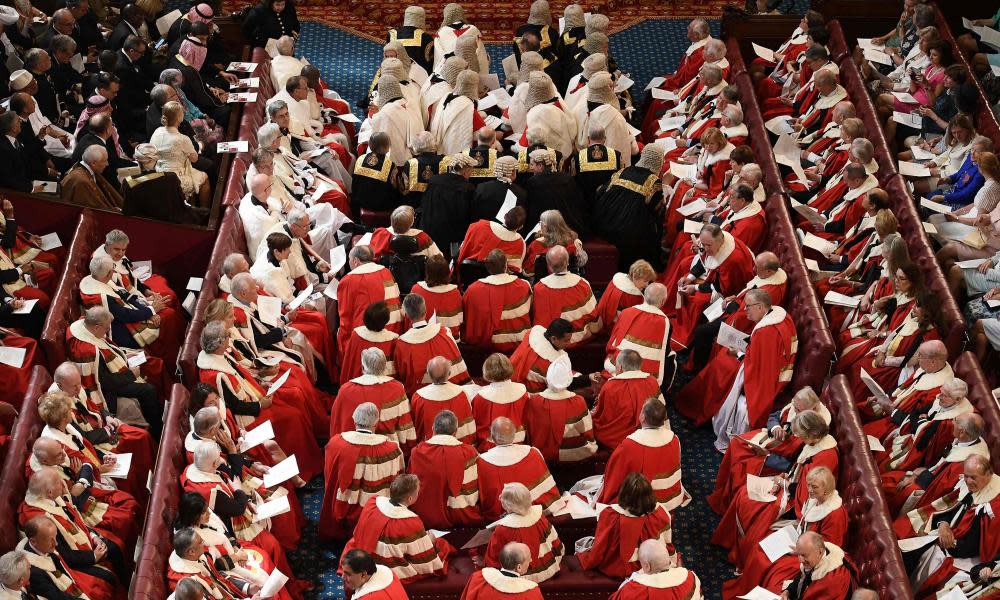Yes, the House of Lords needs reform. Why not create vocational peerages? | Maurice Glasman

As we crawl towards Brexit, it is inevitable that our attention will turn towards our institutions of national self-government. As parliamentary sovereignty is reasserted, the anomalies of the UK’s ancient constitution will re-emerge. Not the least of these is the House of Lords. There was a suggestion this week that there should be 15-year terms for newly appointed peers to limit their overall numbers. This does not really get to the point. The dilemma is that the unelected nature of the Lords supports the supremacy of the Commons. If it were elected it would lead to legislative conflict by undermining the democratic mandate of MPs. Paradoxically, the unelected Lords strengthens the democratic authority of the Commons.
While there is undoubted experience, expertise and not a little excellence in the Lords, it nonetheless remains a vestige of cronyism and patronage in our polity that requires reform.
The idea proposed by the government, during the last parliament, of a mirror of the commons called a senate, elected by proportional representation and with 15-year terms is not a very good idea. The Lords is really an extraordinary place. The hereditary peers are selected by internal election, there are people there with genuine distinction in their careers in business, academia, medicine and the church as well as politics. There are moments listening to debates when I am genuinely moved by the experience being brought to bear on the issue. Legislation is very properly amended and revised and a certain civility characterises conversation between parties and more eerily, within them. The number of working-class peers on our benches outnumbers those in the Commons. So, obviously, it has to go.
I would suggest that the Commons is locational democracy, where people are elected from the places where they live. There was a referendum on electoral reform a few years ago and it was overwhelmingly in favour of keeping the single member constituency system. The Lords, in contrast, should represent vocational democracy. There should be people elected from each sector, whether that be electrical or academic, medical or administrative. Doctors should vote for a peer, as should nurses and cleaners. It would give an incentive to the organisation of carers, builders and gardeners, who would each select a representative from within their organisation.
I recognise that I would not win election to such a distinguished house and would not deserve to
Faith communities should also be elected, with representatives of the Church of England, Sunnis, Shias, Catholics, Hindus and Jews. Their voices would be small, but they should also be heard in the framing of legislation. A recognition of religious diversity and its status as a vocation would thus be recognised within the body politic.
The judges should be returned to the chamber so that it is the final court of appeal, thus restoring the balance of power in parliament. The vocational chamber would revise and amend legislation, as it does now, on the basis of the judgment of people who actually know what they are talking about, who are recognised as experts in their field by their peers through democratic election. It has been the greatest honour and privilege to sit in parliament, but I recognise that I would not win election to such a distinguished house and would not deserve to.
The move towards becoming a self-governing democracy once more demands that we recognise the weaknesses of the prevailing system and take steps to remedy them. The representation of the working life of society, in its myriad of vocational forms, would bring experience and knowledge where currently it is lacking. The role of the Lords is to advise, amend and suggest, so that would not interfere with the primacy of the Commons but complement it.
It would be a form of constitutional and institutional renewal that serves modern demands within the constraints of a meaningful tradition and offers an alternative to the status quo that would be consistent with its historical form. Such an arrangement would ensure that the working life of the country is represented in parliament.
• Maurice Glasman is a Labour life peer and director of the faith and citizenship programme at London Metropolitan University

 Yahoo News
Yahoo News 
